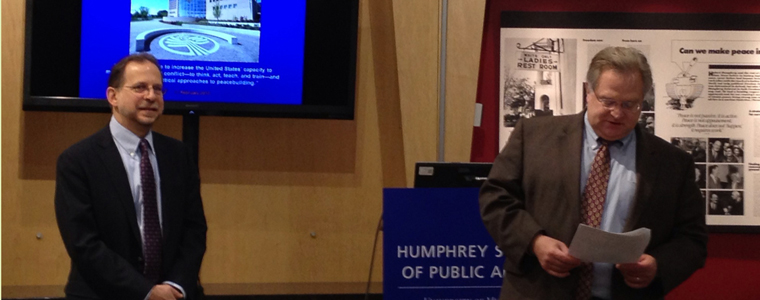In collaboration with the University of Minnesota’s Hubert H. Humphrey School of Public Affairs, the U.S. Institute of Peace (USIP) was in the Twin Cities on March 1, to conduct a Grant Writing & Development Workshop.

Hosted and opened by the dean of the Humphrey School and former USIP Jennings Randolph Senior Fellow, Eric Schwartz, the grantwriting workshop was attended by 25 participants, primarily from the University of Minnesota and nongovernmental organizations in the greater Minneapolis-St. Paul area.
“We were delighted to host and partner with the U.S. Institute of Peace on this grantwriting workshop—an initiative that attracted a wide range of professionals from academic institutions and nongovernmental organizations serving communities across the region,” said Schwartz, who had also served as assistant secretary of State for Population, Refugees, and Migration from 2009 until 2011.
USIP’s Steve Riskin, special assistant to the president for grants, who coordinates grantmaking activities for USIP, conducted the three-hour workshop. Riskin was impressed with the depth of questions and quality, diversity, and commitment of the Minnesota organizations participating in the workshop.
The interactive session delved into the best practices for developing competitive grant proposals -- from project conception and design to impact evaluation -- and strategies for identifying potential funders. Like previous USIP workshops last year in Vermont, South Carolina, Texas and Illinois, the session at the Humphrey School was very well attended and attracted a range of interested people, from the higher education community to local nonprofit organizations working on such issues as education, immigration, and health.
Following their visit to the Twin Cities, Riskin and USIP Senior Program Officer Elizabeth Murray traveled to Carleton College in Northfield and gave a presentation on “Careers in Peacebuilding,” highlighting advancements in international peacebuilding and how they relate to college students’ future careers. Both Riskin and Murray were pleased to see the students’ strong interest in foreign policy, peace, and social justice, and their enthusiasm about the prospect of careers in nonviolent conflict resolution and international peacebuilding. The discussion was organized by Christopher Tassava, Carleton’s associate director of corporate & foundation relations, and drew students from Carleton College and St. Olaf College.

USIP was especially appreciative of the warmth and hospitality of both Minnesota institutions and audiences.
USIP is our country's global conflict management center. Created by Congress in 1984 to be independent and nonpartisan, its works to prevent, mitigate and resolve international conflict through nonviolent means.




